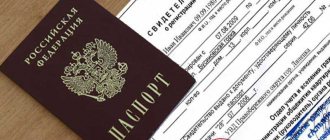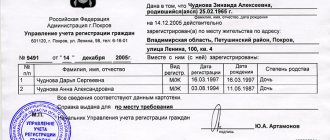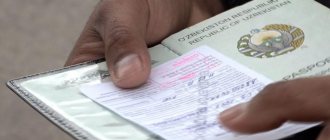Legal advice > Real estate > Registration > Is temporary registration possible without permanent registration?
Temporary registration without permanent registration gives a citizen many opportunities and allows, at least for a certain period of time, to solve many problems that await a person who does not have registration at all. There can be many reasons why a person is left without the treasured stamp in his passport, and as a result, thousands of Russian citizens constantly face infringement of their rights and freedoms. What does a citizen without registration have the right to, and what does temporary registration provide?
What you need to know
Thanks to temporary registration, you can solve a large number of problems that await a person who does not have any registration.
Due to the lack of a stamp in the passport, problems with a person’s legal status begin. Registration was necessary back in the days of the Soviet Union, and its absence led to big troubles. Now registration, unlike the Soviet one, is not permission to live in some place. It is simply a notification that a person lives here.
If registration is needed for some time, it is not included in the passport. It’s not at all difficult to find a person who will design it. You can ask a friend, relative or apartment landlord. The period of registration is 1-6 months, it is better that it is issued with each long-term change of place of residence.
In Moscow and St. Petersburg, registration is treated with special attention. You should register temporarily in the following situations:
- If the person does not live in the place for more than 3 months (or 90 days). This can also apply to rental housing. For example, students often live in a dormitory during the semester. But for three months, the police can simply show a ticket stating their arrival.
- When living for a long time in institutions such as sanatoriums or campsites. The law requires registration in this case even after staying for more than a month, but in practice this is rarely carried out.
- If the person has rented housing. Then permanent registration is desirable, but the landlord may not want this, since it is unknown how long the tenant will stay.
Sometimes temporary registration may be denied due to ignorance. For example, some owners are afraid that a child registered in an apartment will someday make a claim against their living space. But this is fundamentally wrong: registration has nothing to do with ownership.
Why do you need temporary registration without permanent registration?
They remain without registration for various reasons. For example, a person lost his home due to debt. Or I sold my apartment in order to buy an unfinished apartment in a new building. There are many other reasons for losing a stamp.
Formally, life without registration is possible. But you will just have to face a number of difficulties. It will be much more difficult to get a job. Such an employee will be fired earlier than others. Finding another job is very difficult. Medical care will also be difficult. No one will teach the children, and guardianship authorities may remove children from the family.
The law prohibits being unregistered for a long time. In any case, a citizen will have to register at his place of residence, and a new building may still take quite a long time to build.
Registration rules apply equally to adults and children. Persons under 18 years of age will have to provide a passport; if they are 14 years old, a birth certificate; if they have citizenship of another state, a foreign passport.
Advantages and disadvantages
The main advantage of temporary registration is its low price.
In addition, you will not have to pay at once, but can pay in installments. It is very important that persons with temporary and permanent registration have equal rights. Permanent registration is not always necessary. Sometimes you just need to register for a while to enjoy all the benefits of registration.
The disadvantages include some unpleasant moments. For example, an employer does not have the right to refuse work due to lack of permanent registration, but at the same time he can come up with other reasons not to hire someone who is not trustworthy due to temporary registration.
The reluctance to hire a person with temporary registration is due to the uncertainty that the employee will live here permanently. Moreover, visitors are not always protected by the law, so both parties will need to obtain official permission to work.
Another point is that temporary registration does not give permission to obtain an insurance policy. It will not be possible to receive credit in stores. The bank will also find it difficult to decide whether to issue it. There will be no mortgage loan. And these are not all the shortcomings. This type of registration is quite complicated. Sometimes documents may turn out to be fake. You need to be able to avoid potential scammers.
How to check out with temporary registration?
After we have determined what temporary registration is, what responsibilities it imposes on a citizen, and have determined whether it is necessary to register after the expiration of this document, we can determine the immediate process of deregistration with the territorial body of the Ministry of Internal Affairs.
In particular, a citizen must undergo the following procedure:
- Prepare an application for discharge using the prescribed form.
- Receive a corresponding application from the owner of the residential premises.
- Visit the territorial office of the Ministry of Internal Affairs to which the residential premises are assigned.
- Fill out the departure form (it will be useful for new registrations in the future).
Obviously, this procedure is not something complicated. The most important thing here is to realize the fact that until the temporary registration expires, any actions to change the place of residence oblige the citizen to be deregistered. In the event that the registration has ceased to be valid, the deregistration occurs automatically and does not impose additional responsibilities on the citizen.
Current standards
In some cases, temporary registration is simply not enough. If a citizen permanently lives in the city, he must register on a permanent basis. But you can register temporarily for 90 days.
A person has the right to have both permanent and temporary registration. And you don’t need to leave your place of permanent residence.
Temporary registration is registered with the Federal Migration Service.
To obtain it, you need a passport, an extract from the house register, documents confirming the grounds for residence, and an application.
Now it is not necessary to contact the Federal Migration Service in person. It is possible to send documents by registered mail. But then they must be certified by a notary. The maximum validity period is five years. Then it is extended.
The premises must be suitable for habitation. You can also register in a boarding house. The citizen provides the Federal Migration Service with a certificate of departure from the place of permanent registration. If there was no registration anywhere, you will have to pay a fine. You can download a sample application on the official website of the Federal Migration Service.
What is included with the application:
- Copies of the landlord's and tenant's passports and children's birth certificates;
- Optionally, a rental agreement, a certificate of title to living space, or another document that confirms the right to property;
- Consent of the people living there;
- A receipt confirming that the fines have been paid.
Important! The ownership papers may not be provided, the main thing is to provide information about the relevant documentation.
You cannot register in the following living space:
- In disaster zones;
- In closed military camps;
- Where the fighting takes place;
- Where the area is contaminated.
How is a temporary registration obtained in the absence of a permanent one?
Temporary registration is issued in any premises: both an apartment and a house
You can apply for temporary registration in any residential premises: it can be an apartment, a private house, a dorm room, etc. If a citizen has been discharged, he must provide the FMS with a departure slip, which is issued upon deregistration.
If for some reason there was no registration at all, and this also happens quite often, the citizen will have to pay a fine under Article 119 of the Code of Administrative Offenses. Its size depends on the region: in the provinces it will be about 2,000 rubles, in Moscow this amount can reach 7,000 rubles.
To register a person, the owner must come to the Federal Migration Service and write an application using Form No. 1; a sample can be obtained from the local migration service office. The following documents are attached to this application:
- Landlord and tenant passports. Remember that with an officially registered rental of living space, you will definitely have to resolve the issue of taxes.
- Commercial lease or social tenancy agreement. It confirms the relationship between the owner and the person he registers.
- Consent of all registered residents. If children under the age of 14 are registered in the apartment, you will also have to obtain the consent of the guardianship and trusteeship authorities.
- Copies of the landlord's and tenant's passports or other identification documents.
- Receipt of the fine paid. You can pay it at any bank.
All documents are submitted to the migration service, and the issue of temporary registration is resolved within three days. After checking all the documents, the tenant receives a temporary registration document indicating the validity period. When this period comes to an end, the question will arise again with the same urgency, and again you will have to decide where to register.
The period for reviewing documents may be increased if they are submitted not in person, but through the government services portal or via mail. In addition, the process may be delayed if the citizen lived for a long time without registration, and the migration service will collect information about the place of last registration. Unfortunately, a large number of documents and bureaucratic red tape, as well as high taxes, force homeowners to refuse temporary registration to tenants.
Because of this, thousands of people live in both Russian capitals either without registration at all, or with permanent registration in the regions, and at their place of residence they remain unregistered. This significantly limits their rights and privileges available to native Muscovites and St. Petersburg residents.
Registration procedure
Unlike permanent registration, temporary registration can only be valid for a specified period.
To receive it, you must submit the documents mentioned above. In addition to the main package of documents, the Federal Migration Service must also show a certificate of departure from the previous place of residence. The application can be taken at the place of stay. The application must strictly comply with the form. Once the documents have been submitted and the fine has been paid, you can register within three days.
Personal appearance at the Department of Internal Affairs of the Ministry of Internal Affairs is far from the most convenient way. Citizens stand in long queues. Documents are submitted and processed within three days. Then you have to wait another eight days for permission. During this time, service workers will collect information about the citizen.
Ordering by mail takes the longest. Although there is no need to appear at government agencies in person. In addition to documents, you will also need an address sheet and a registration sheet.
It's best to apply online. If a citizen has his own computer, he can log into his personal account on the State Services portal. You can submit documents online.
Just visit your personal account, select the “Temporary registration” option or follow the link. This way you can send copies of all the necessary documents. You will have to wait three days, then you will receive a notification that you can come for a certificate.
You must bring all documents in original. The registration certificate indicates the passport details, place of registration and its duration.
Procedure for discharge and registration
- Find suitable housing whose owner is willing to issue temporary registration for tenants.
- Discuss deadlines and other details.
- Collect documents or prepare them. The latter is relevant if you are planning a standard rental property. In such a situation, it is important to provide a document that will become the basis for such registration. This could be a regular lease agreement.
- Contact the MFC (My Documents) and wait your turn. Queues are the main problem with such registration, since the MFC deals with many tasks at once and often you have to wait from several minutes to several hours. Many owners refuse such registration only for this reason - they do not want to waste so much of their own time.
- Submit the documents to the responsible MFC employee and fill out an application. The application form and template for filling out are provided on site. There is no particular point in preparing this document in advance.
- Receive a certificate confirming the fact of transfer of documents to the MFC for temporary registration
In many cases, the temporary registration is placed on a separate sheet and not in the applicant's passport. Nevertheless, passports are also confiscated for the entire period of registration.
- At the specified time, come for your documents and a certificate of temporary registration. In practice, you can pick up documents much faster than submitting an application. Moreover, the owner is no longer required here.
Refusal to register at the place of stay
Despite the legal nature of temporary registration, people who are looking for the opportunity to register are faced with refusals for various reasons.
Citizens are sometimes turned away due to the small size of their living space. Moreover, such a refusal has nothing to do with legality: the law on “rubber apartments” is not yet in force, and therefore there is no requirement for one citizen to register for a certain number of square meters of housing.
A foreigner who has violated the necessary accounting rules may receive an unexpected refusal. But at the same time, a legal refusal is possible only if the court has already signed a verdict on his expulsion from the country. If he was not expelled, but the terms of his stay in this territory were violated, the FMS must register him, but he will have to pay a fine.
Another possible reason for refusal is a lack of documents necessary for this case. Officially, the law does not force the owner to present papers, but copies of documents may still be requested. Because of this, the procedure is delayed, since there are always very long queues for appointments at the FMS.
Providing accommodation in a hostel
Living in premises of this kind is due to various personal reasons. There are often cases when this happens because a person does not have his own real estate. However, most often this is associated with admission to an educational institution or employment.
While studying
Admission to an educational institution can become the reason for moving not only to another locality, but also to a subject of the Russian Federation. In the latter case, if a person is a full-time student, it will be difficult to return daily to his place of permanent registration. In such situations, it is necessary to register in a constituent entity of the Russian Federation. For a student, the best way is to get a room in a dormitory.
In this case, registration in the hostel will be limited not only to a certain period, but also to the occurrence of certain circumstances. For example, a person will be registered only for the duration of his studies. However, if he is expelled before graduation, he will have to vacate the occupied space. The reasons may be different, for example, poor academic performance or personal desire. Regardless of the circumstances, the person will be evicted. This is due to the fact that the hostel is provided to the student precisely for the time he is a student. Eviction on these grounds cannot be a reason for filing a lawsuit in court, since the parties initially agree on such a condition, and this rule does not contradict the requirements of the law.
A student can also be deprived of the right to a dormitory in case of violation of current sanitary standards.
During work (service)
You can also move into the hostel during work or service.
A person does not always have a place to live at the location of the organization in which he works. This may also be related to the performance of public service duties. In such cases, a legal entity can provide a person with a room in a dormitory. Many organizations have similar funds at their disposal.
Accommodation in a hostel in such cases is limited only by the occurrence of certain circumstances, namely the fact of working in an organization or serving in a government structure. As in the case of studies, such a condition is agreed upon by the parties initially, and eviction cannot be a reason for filing a lawsuit in court.
At the same time, it is not only the end of a job that can cause loss of housing. Even if they conscientiously perform their official duties, a person can be evicted from the hostel. This may be due to violation of sanitary standards, use of the premises for other purposes, or violation of the rights of other residents.
What are landlords afraid of?
Fear 1. The tenant, who has registered in the apartment for a while, will dispose of it as he pleases.
In fact, the place of residence is not official in this case. You can only use the apartment. In this case, it is impossible to manage and own the living space. Therefore there is nothing to be afraid of.
Fear 2. If necessary, it will not be possible to evict a family with children.
Yes, you can register your children. And there is no need to tell the owner about this. But this will not cause any harm to the landlord. As soon as the parent’s registration period ends, the child’s registration period also ends. Temporary registration is valid from six months to five years.
Therefore there is nothing to be afraid of.
Fear 3. You will have to spend more on utilities.
Yes, the more citizens registered, the more expenses. This fear is justified, unlike the previous ones. But you can introduce a requirement to pay utility bills into the lease agreement. They may fall on the shoulders of the tenants.
Fear 4. It is impossible to sell an apartment with registered tenants.
This fear is not justified. Although no one wants to purchase apartments with citizens registered in them, by law the landlord has the right to deregister guests himself. It is not hard. We just need to give residents time to find new temporary housing. This fear is not justified.
Fear 5. Tenants may be formally registered and then leave without warning.
You need to know that a temporarily registered citizen resides legally. Square meters should really be used for their intended purpose. Fictitious registration costs the owner a large fine. Therefore, fear is justified.
And yet it is now clear that most of the fears are not justified.
So, temporary registration solves many problems at once. It is advisable to register immediately after arriving in another location for more than 90 days. Otherwise, no one will provide free medical care, teach children at school or issue a loan. Many landlords refuse. But their fears are mostly unjustified.
You can apply for registration at the Federal Migration Service, by mail or through the State Services portal.
This video contains up-to-date information on how to make a temporary registration on the State Services portal:
See also Phone numbers for consultation February 26, 2021 Victoria M. 573
Share this post
Discussion: 2 comments
- Albina says:
06/05/2020 at 00:20A friend temporarily moved to another region and she and her husband did not have permanent residence there. But there was a second cousin who gave them temporary registration. This is what my work friend needed
Answer
- Anna says:
06/09/2020 at 12:54
We lived in another city for several years and the owner of the apartment gave us temporary registration. I know that it is possible to obtain permanent registration, but no one wants to do this, they are afraid for their property
Answer











